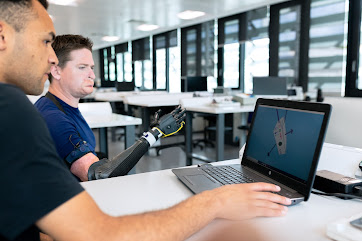The Role of AI in Healthcare: Exploring the Benefits and Risks of AI in Medicine
Today, I wanted to dive into a really interesting topic: the role of AI in healthcare. We all know that technology has been advancing at a rapid pace in recent years, and the healthcare industry is no exception. From diagnosing diseases to helping develop new treatments, AI is changing the game in many ways.
First of all, let's talk about some of the benefits of AI in healthcare. One of the biggest advantages is that it can help doctors and other healthcare professionals make more accurate diagnoses. By analyzing vast amounts of data, AI algorithms can pick up on patterns and potential indicators that a human might miss. This can lead to earlier diagnoses and better outcomes for patients.
Imagine a scenario where a patient walks into a clinic with a range of symptoms. The doctor may perform a physical exam, ask the patient about their symptoms, and then order some diagnostic tests. The results of these tests may take some time to come back, and the doctor may have to rely on their own judgment and experience to make a diagnosis.
Now, imagine if the doctor had access to an AI system that could analyze the patient's symptoms, medical history, and test results in real time. The AI could use machine learning algorithms to identify patterns and potential indicators that the doctor may have missed. This would enable the doctor to make a more accurate diagnosis and develop a more effective treatment plan.
Furthermore, AI in healthcare can also help with tasks such as predicting patient outcomes, identifying high-risk patients, and personalizing treatment plans. With the help of AI, doctors can gain a better understanding of the unique needs of each patient and develop tailored treatment plans that are more likely to lead to positive outcomes.
Another benefit of AI in healthcare is that it can help researchers develop new treatments more quickly and efficiently. By using machine learning to analyze data from clinical trials and other sources, scientists can identify new targets for drugs and therapies that might otherwise have gone unnoticed. This could lead to breakthroughs in the treatment of diseases like cancer, Alzheimer's, and more.
AI has the potential to revolutionize the process of drug discovery and development in healthcare. The traditional approach to drug discovery has been time-consuming and expensive, involving years of research and development, followed by clinical trials to test the safety and efficacy of a potential treatment. However, AI has the ability to analyze large amounts of data from clinical trials, medical records, and scientific research to identify new drug targets and potential treatments in a matter of weeks or months.
AI can also help researchers identify patients who are most likely to benefit from a specific treatment. This is because AI algorithms can analyze large amounts of patient data to identify patterns and subgroups of patients who are more likely to respond positively to a particular treatment. This personalized approach to medicine could lead to more effective treatments with fewer side effects.
Furthermore, AI can help researchers to repurpose existing drugs for new uses. By analyzing the molecular structure of drugs, AI algorithms can identify similarities between different drugs and suggest new applications for existing treatments. This could significantly reduce the time and cost involved in developing new drugs and treatments.
Of course, it's not all sunshine and rainbows when it comes to AI in healthcare. There are some risks and challenges that we need to consider as well. One of the biggest concerns is privacy. With so much personal data being collected and analyzed, there is a risk that it could be misused or fall into the wrong hands. We need to make sure that we have robust security measures in place to protect patients' sensitive information.
Another risk is the potential for bias. Like any technology, AI is only as good as the data it's fed. If the data is biased or incomplete, the algorithms could end up making inaccurate or unfair recommendations. We need to make sure that we're using diverse and representative data sets to train our AI systems.
Conclusion
AI is definitely changing the game in healthcare, but we need to be aware of the risks and challenges as well. By working together to develop responsible AI systems and policies, we can ensure that this technology is used to its full potential to improve human health and well-being.
My name is Spec and I own a small media company called OnTheSpectrum Media. I'm autistic and I create content along with a few others who are also neurodivergent. If you would like to see some of our human-generated content feel free to have a look at the links below.
TheScottishScott
If you prefer some video content why not check out our YouTube channel.
https://www.reddit.com/r/GPTWriting/




Comments
Post a Comment